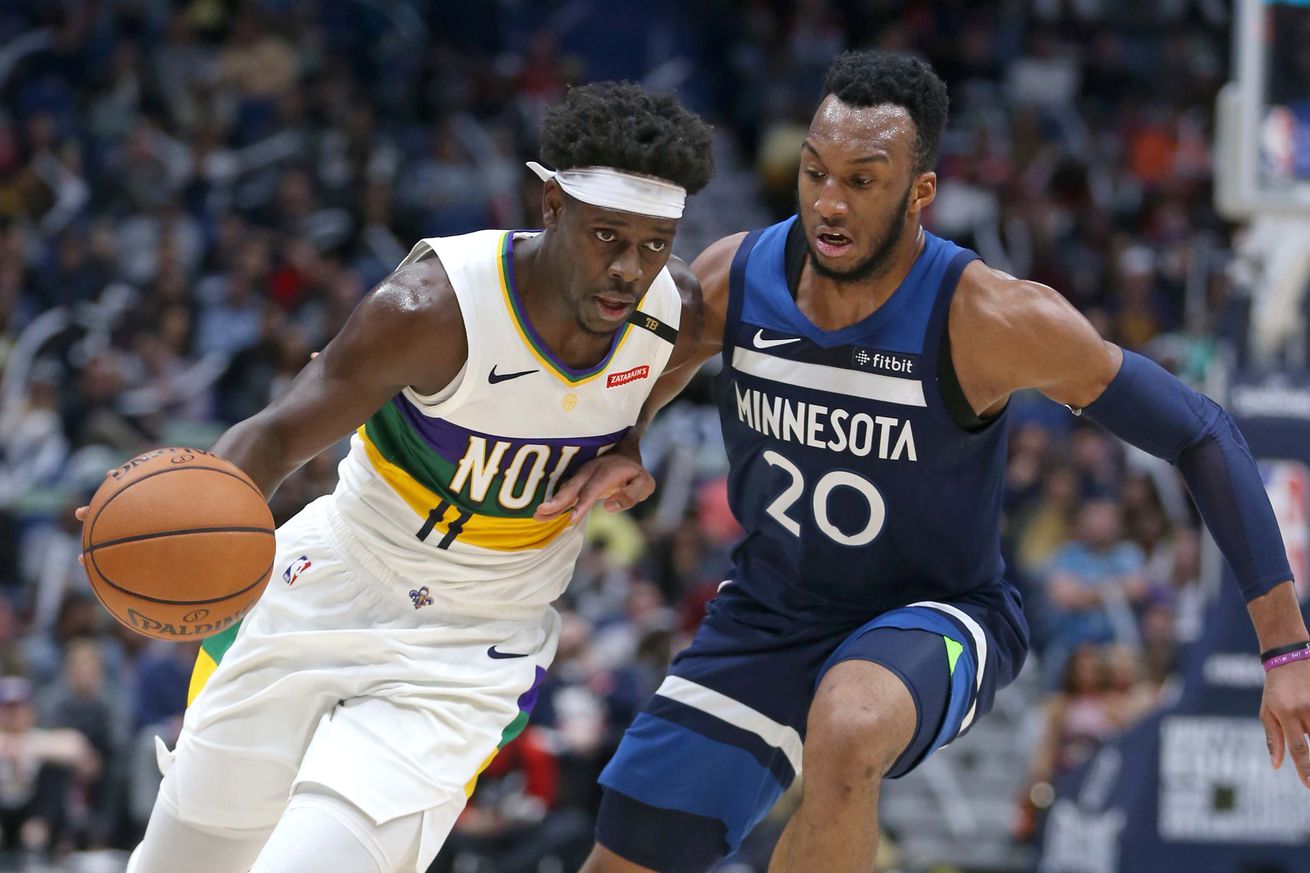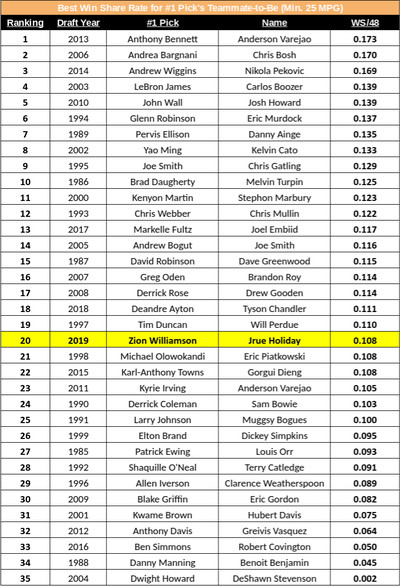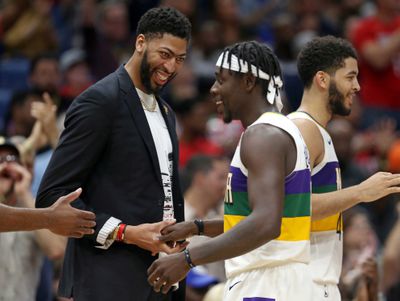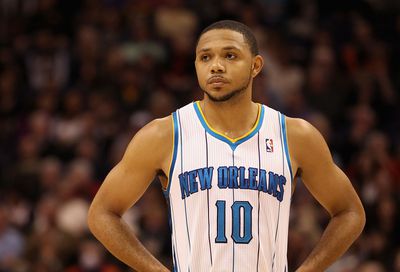MikeDelayo
Guest
Offline

Is Jrue Holiday the best player to stick around on a lottery-winning team?
When the New Orleans Pelicans won the 2019 NBA Draft Lottery, it was a bit of a shock. They had the seventh-best odds (6 percent) of doing so, which are relatively good, but their 33-49 record is a far cry from what was expected before the season began. The Anthony Davis-fueled tumult, and the games it caused the star forward to miss, was aided by early season injuries, the trade of Nikola Mirotic to Milwaukee, and the season-ending abdominal injury to Jrue Holiday down the stretch in bringing that record so far down.
At the beginning of the offseason, it was unclear what the team’s future with Holiday would entail. However, his noted excitement at the lottery win and desire to be the face of the franchise seemed to be a sign that he would stick around, at least in the immediate future. All of this, as well as Holiday’s dynamite finish to the regular season and second team All-Defense selection, begs the question: has any number one overall pick inherited a teammate better than 2018-19 Jrue Holiday?
In an attempt to find out, I compiled a list of the top-performing player on each team that wound up with the number one pick in the lottery era (since 1985), accompanied by the top pick and they year they were drafted.
The teammates listed met the following qualifications:
- Regular contributor for the team in the season prior to making the top pick (at least 25 games played and 25 minutes per game)
- Teammate at the start of the top pick’s rookie season
- Highest Win Shares Per 48 Minutes during the season prior to the pick
Win Shares attempt to quantify with one number the contributions a player makes to their team’s win total. Is it a perfect stat? No. Is it still useful? Yes, and that it is both publicly available (I used Basketball Reference) and conducive to the creation of tables like this one makes it even more so. To better represent the true ability and production of the players and offset the effect injuries and transactions can have on the raw Win Shares data, I used Win Shares Per 48 Minutes (for reference, the league average WS/48 is .100).
Without further ado, here are the results:

Remember when Anthony Bennett went first overall in 2013? That happened! If it is any consolation to the Cleveland Cavaliers, Victor Oladipo and Giannis Antetokounmpo are the only players in that entire draft class to have made an All-Star team so far. It’s a shame that Bennett did not work out for a number of reasons, but most relevant among them is that his teammate, Anderson Varejao, tops this list!
Injuries plagued the longtime Cleveland big man at nearly every turn of his otherwise surprisingly efficient 13-year career, but he stayed on the court for just long enough in 2012-13 (25 games played). A 20-year-old Kyrie Irving was the star of that Cavaliers team, but his .125 WS/48 could not match that of Varejao, whose career-highs in total rebound percentage (23.2 percent), assist percentage (15.4 percent) and PER (21.7) combine to make quite an efficiency cocktail.
Before we get to the Pelicans wing of this exercise, it must be mentioned that Varejao has the distinct honor of being the top teammate for two number one picks; his .105 mark in 2010-2011 was a lot less impressive, but so too (somehow) were those Cavaliers, who in their first post-LeBron James campaign was led in minutes played by J.J. Hickson, Ramon Sessions and Anthony Parker. Yikes.

Jrue Holiday and Anthony Davis, friends and former teammates
If Davis had remained on the Pelicans for the 2019-20 season, he would easily top this list with a WS/48 of .247. He produced at 2.47 times the level of a league-average player, and though that is not the highest rate of his career (his 2014-15 mark was .274), it is still indicative of an All-NBA caliber player. The 74-point difference between .247 and the would-be second-best mark (Varejao’s .173) would be bigger than the one between the second- and 24th-best (Muggsy Bogues’ .100), which seems about right; players this good are not usually on teams that played poorly enough to wind up with the number one pick.
One that was, however, is David Robinson, whose name likely leaped to the forefront of many minds after reading the first few paragraphs. But because The Admiral played just six games in the 1996-97 season before sitting out with a broken foot. They then won the draft lottery and selected Tim Duncan, who was and, despite retiring in 2016, probably still is good at basketball.
Chris Bosh may not have been able to top Varejao, but he was the only teammate on the list to make an All-Star team in the season in question. It was the first of 11 straight All-Star selections for Bosh, but unfortunately for Toronto, Andrea Bargnani was able to reach that level. That was last decade though; I think The North has weathered the storm just fine.
Varejao may be the only player to appear in the teammate column for multiple seasons, but he is not the only player with his name on the list twice. Joe Smith, the first pick of the Golden State Warriors in 1995, was a teammate to fellow big man Andrew Bogut when the Milwaukee Bucks drafted the Australian first overall a decade later in 2005. Smith’s name surfaced other times in the research as well (he ranked right behind Drew Gooden on the 2007-08 Chicago Bulls, for instance, but was traded mid-season anyway), which is on the one hand indicative of a career gone awry for a former first pick. On the other hand, he found work in the league for 12 teams over 16 seasons, which at the end of the day is the mark of a well-liked player and a solid career. Good for you, Joe Smith.
One of the more surprising results on the list may be from just last year. Deandre Ayton’s best teammate at the start of the season was Tyson Chandler, who had played exactly 25 minutes per game the season prior and stuck around for a whopping seven games this season before being shipped off to Los Angeles. Devin Booker is not absent because he’s ineligible, but because he simply was not good enough in the 2017-18 season. His .063 WS/48 ranked behind the likes of Alex Len, who signed with the Atlanta Hawks in the offseason, Chandler, Greg Monroe, Shaquille Harrison and Isaiah Canaan, none of whom played enough games, and T.J. Warren. A tough look for the young Suns guard, to say the least.
LeBron James was famously bereft of quality teammates during his first seven seasons in Cleveland, but a young Carlos Boozer was a rare exception. Boozer ranks fourth with a WS/48 of .139, made even more impressive by the fact it was his rookie season. However, after an even better sophomore season alongside James, an odd free agency dispute brought an abrupt end to his tenure in Ohio.
Boozer is joined by two other rookies on the list: Brandon Roy and Eric Gordon. Though Greg Oden didn’t debut until more than a year after being drafted in 2007, Roy was still around and coming off of the first of three consecutive All-Star selections. His less-heralded 2006-07 production was just enough to beat out fellow rookie LaMarcus Aldridge, whose slightly superior .118 WS/48 was done in by a workload of just 22.1 minutes per game.
Gordon’s situation was eerily similar to that of those Trail Blazers, as he had to wait an entire season before playing alongside the fruits of the 2008-09 Los Angeles Clippers’ incompetence, Blake Griffin. Marcus Camby was the top contributor in that horrid season (.129 WS/48), but he was shipped off to Portland months before Griffin was ready to make his debut.

Eric Gordon, former New Orleans Hornet
Had Gordon remained healthy during his first season in New Orleans, he could have joined Varejao in the vaunted two-timers club. Alas, a knee injury limited him to just nine games in the season that would ultimately lead to the selection of one Anthony Davis. That five other Hornets met the 25 minutes per game and games played benchmarks would appear to make finding the presumptive next in line quite easy.
It was not easy.
The actual team leader in WS/48 with .142 was the legendary Gustavo Ayon, but he only played 20.1 minutes per game. Even if Carl Landry hadn’t signed with Golden State in the following offseason, his 24.4 minute average would have similarly kept him off of the list. Jarrett Jack also had a new home for the 2012-13 season, as did Emeka Okafor, Trevor Ariza and Marco Belinelli. Trey Johnson played just 61 minutes, which would be his last in the NBA, and while Jason Smith and Lance Thomas stuck around, they too missed the minutes qualification. In the end, the player with the team’s 11th-best WS/48 cracked the list: Greivis Vasquez.
Suffice to say, Williamson will be much better off. Although today is a time of celebration for New Orleans basketball, we do not have to simply assume 2018-19 Holiday was probably better than most of the players on this list.
The lone highlighted row is designated for 2019 and contains the freshly-drafted Zion Williamson and Jrue Holiday. Considering some of the other names on this list, it is fair to be shocked by Holiday’s ranking in the bottom half. This would be a good place to note that Win Shares (the formulas of which can be examined in detail here) can miss the mark a bit on the defensive end, as team success (via defensive rating) plays a core part in the equation. To prove this point, let’s quickly introduce the use of another widely-used metric to this exercise: ESPN’s Real Plus-Minus.
| Year | Incoming #1 draft pick | Best inherited teammate | RPM | RPM Rank |
|---|---|---|---|---|
| 2019 | Zion Williamson | Jrue Holiday | 4.61 | 17 |
| 2018 | DeAndre Ayton | Tyson Chandler | -0.26 | 173 |
| 2017 | Markelle Fultz | Robert Covington | 3.55 | 25 |
| 2016 | Ben Simmons** | Robert Covington | 1.60 | 75 |
| 2015 | Karl-Anthony Towns | Ricky Rubio | 2.71 | 53 |
| 2014 | Andrew Wiggins | Ricky Rubio | 3.90 | 29 |
With RPM still a relatively new statistic, we cannot go back any further in time, but the conclusion is clear: Jrue Holiday is currently one of the best players in the league and he looks likely to top the list of the best player to stick around on a lottery-winning team.
In theory, finishing with that bonkers New Orleans situation and then eliminating anxiety about Holiday’s worth around the league is the perfect place to end this piece. However, please remember Davis’ best teammate was Vasquez, ranking 32nd out of 35 entries on the WS/48 list, in comparison. Thus, let’s take a moment to acknowledge DeShawn Stevenson of the Orlando Magic.
Stevenson, whose NBADraft.net player comparison was Michael freaking Jordan, went on to average 7.2 points per game in a career that somehow impressively lasted 13 seasons. Chief among his accomplishments, even more so than his championship ring with the Dallas Mavericks in 2011, is his placement on this list despite having a WS/48 of .002, good for 16th-best on the 2003-04 Orlando Magic. SIXTEENTH!
For one reason or another, Tracy McGrady, Lee Nailon, Shammond Williams, Andrew DeClerq, Rod Strickland, Juwan Howard, Desmond Penigar, Sean Rooks, Drew Gooden, Tyronn Lue, Gordan Giricek, Derrick Dial, Keith Bogans, Steven Hunter and Zaza Pachulia found themselves out of the running, resulting in a singularly chaotic result.
Given how many transactions teams make to improve (or at least theoretically improve) their teams each offseason, the utility of this exercise is limited. Even the 2004-05 Magic, amidst all of that turnover, finished 36-46. If anything is to be taken away from this, it is that even in the midst of the franchise he covers drafting a potentially transcendent talent, one writer opted to instead write about Anderson Varejao and DeShawn Stevenson.
I regret nothing.
Continue reading...

